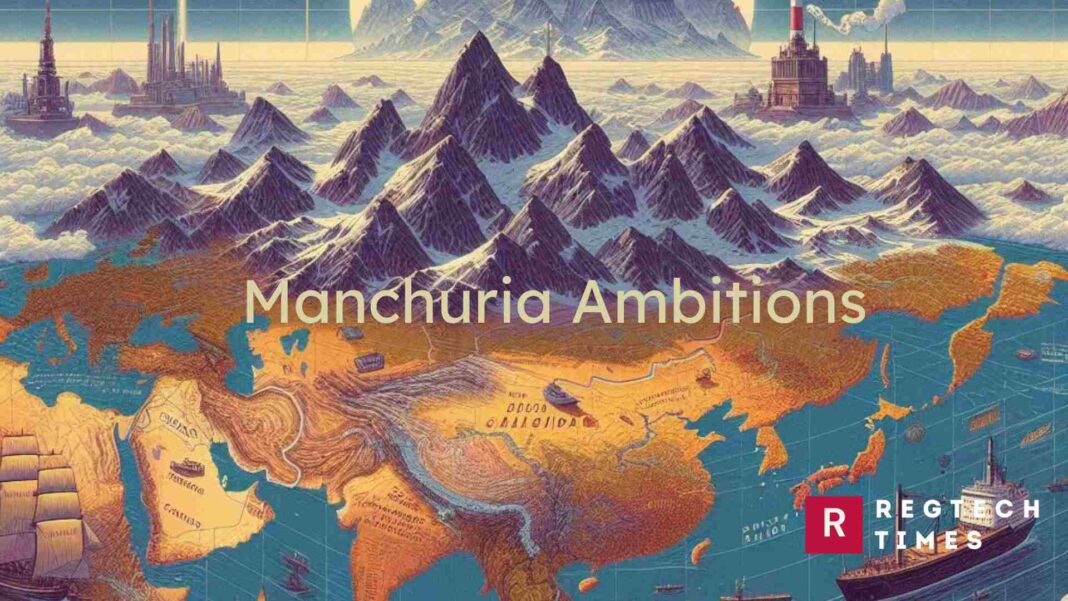Canadian journalist and author Diane Francis believes that China is also preparing to take back a slice of land in the far east of Russia. Speaking to Times Radio, she explained how the war in Ukraine may have an impact on Beijing-Moscow relations over the Manchuria region.
As tensions between global superpowers continue to escalate, the intricacies of international relations come sharply into focus. Recent statements made by key figures shed light on the complex web of alliances, betrayals, and strategic manoeuvring that define the geopolitical landscape. At the heart of this intricate dance lies the enduring relationship between Russia and China, two formidable players with their agendas and ambitions.
The words echo with a sense of foreboding: “This is a very uneven Federation controlled by an elite in Moscow and St. Petersburg.” This candid assessment points to a fundamental truth: Russia, despite its vast territorial expanse, is plagued by internal divisions and disparities in power and influence. The centralized authority wielded by the elites in Moscow and St. Petersburg stands in stark contrast to the aspirations of regional sovereignty movements, which seek to assert their autonomy and independence.
The Specter of Sovereignty Movements
Amidst this backdrop of internal discord, the specter of sovereignty movements looms large. From Chechnya to Chita, regions across Russia have long grappled with the question of self-determination. The bloody wars fought in places like Chechnya serve as stark reminders of the deep-seated tensions that simmer beneath the surface. And as Moscow’s grip on power weakens, the voices of dissent grow louder, paving the way for a potential unravelling of the federation.
China’s Calculated Moves
But what role does China play in this intricate geopolitical chessboard? As the world watches with bated breath, China bides its time, carefully assessing the unfolding events. With an economy increasingly intertwined with Russia’s, China has a vested interest in the stability of its northern neighbour. Yet, beneath the surface, a more ambitious agenda may be at play. The whispers of geopolitical analysts suggest that China is patiently awaiting the moment of weakness, poised to capitalize on the fractures within the Russian Federation.
You May Also Like
- US Issues Warning to China Over Alleged Support for Russia in Ukraine Conflict
- US Issues Warning: China’s Geospatial Intelligence Support to Russia
- Copper Wire Rod Deception: China-Russia Trade Exposed
The Manchuria Dispute
At the heart of China’s calculus lies the coveted prize of Manchuria. Stolen from China two centuries ago, this resource-rich region holds immense strategic significance. With Russia’s grip on power weakening, China senses an opportunity to reclaim what it sees as rightfully its own. And as regional tensions simmer, the specter of a Chinese incursion looms large, casting a shadow of uncertainty over the future of the region.
Russia invaded Manchuria in 1900 after the First Sino-Japanese War of 1894-1895.
The Manchuria dispute refers to the historical and ongoing territorial disagreements over the region of Manchuria, also known as Northeast China. The dispute has its roots in the complex history of the region, which has been a source of contention between various powers, including China, Russia, and Japan.
Manchuria was historically inhabited by the Manchu people and was the heartland of the Qing dynasty, which ruled China from the 17th to the early 20th century. However, in the late 19th and early 20th centuries, Manchuria became a focal point of competition between Russia, Japan, and China.
One of the key events that contributed to the Manchuria dispute was the First Sino-Japanese War of 1894-1895. The war was fought between China and Japan over influence in Korea and resulted in a decisive victory for Japan. As part of the Treaty of Shimonoseki, which ended the war, China was forced to cede control of the Liaodong Peninsula in southern Manchuria to Japan.
However, Russia, fearing Japanese expansion in the region, along with France and Germany, pressured Japan to return the peninsula to China. In return, Russia obtained a lease for the strategic Port Arthur (Lushun) and Dalian (Dairen) on the Liaodong Peninsula, as well as railway rights in southern Manchuria. This move by Russia heightened tensions in the region and set the stage for further disputes over Manchuria.
The Russo-Japanese War of 1904-1905 further exacerbated the Manchuria dispute. The war was fought between Russia and Japan over competing imperial interests in Northeast Asia, including control of Manchuria and Korea. Japan’s victory in the war resulted in Russia relinquishing its lease of Port Arthur, but Japan’s control over southern Manchuria and Korea was recognized.
After World War II, the Soviet Union occupied Manchuria and established the puppet state of Manchukuo, which further complicated the territorial status of the region. The Soviet Union eventually returned most of Manchuria to China, but the legacy of these historical disputes continues to influence relations between China, Russia, and Japan to this day
As the US Secretary of State Anthony Blinken embarks on a delicate diplomatic mission to China, the stakes could not be higher. Expressing deep concerns over China’s support for Russia’s defence industrial base, Blinken walks a tightrope, seeking to navigate the treacherous waters of Sino-American relations. Yet, even as he treads cautiously, the spectre of Chinese influence looms large, casting a shadow of uncertainty over the fragile balance of power.
In the intricate game of geopolitics, every move carries weighty consequences. As Russia grapples with internal divisions and external pressures, China waits patiently in the wings, poised to seize the moment of weakness. The future of the region hangs in the balance, as the forces of history collide in a high-stakes game of power and ambition. Only time will tell how the story unfolds, but one thing remains clear: the echoes of the past reverberate loudly in the corridors of power, shaping the destiny of nations and the fate of millions.



